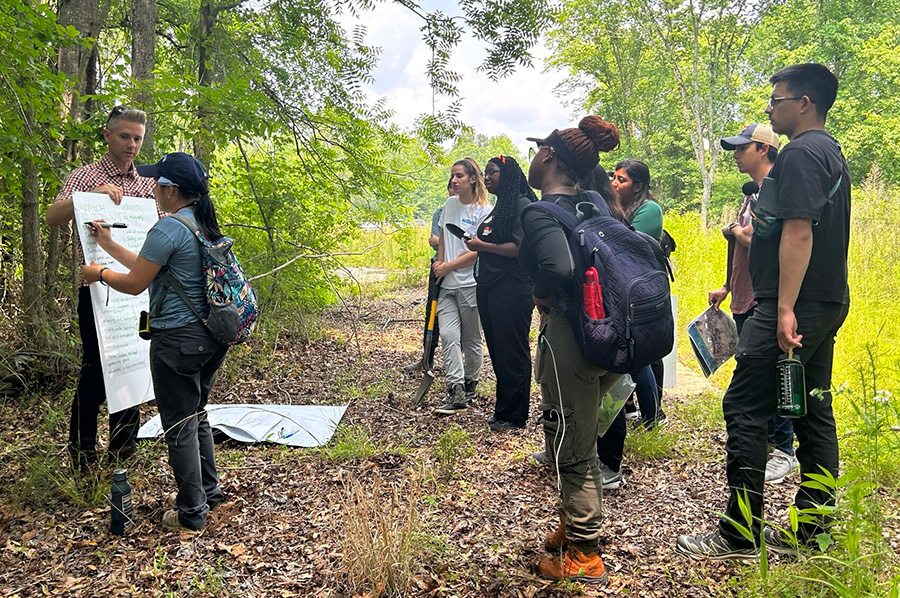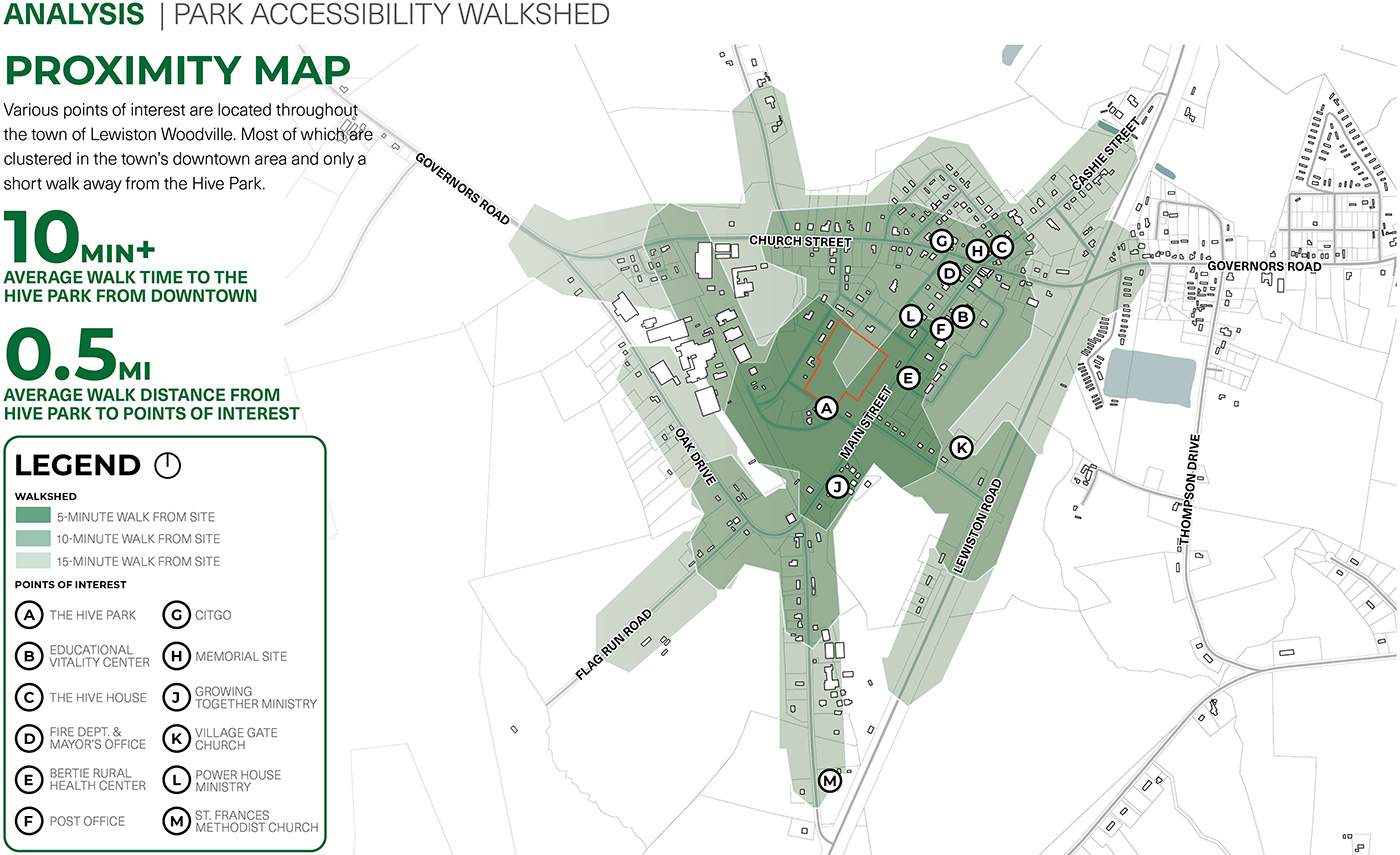News Release

2023 Dr. Charles Fountain Internship Comes to a Close
Posted 8/28/2023
The 2023 Dr. Charles Fountain Internship came to a close with an impressive final plan and design for The Hive Park in Lewiston Woodville, North Carolina. Established in honor of Dr. Charles Fountain, founder of the landscape architecture program at North Carolina A & T State University, the internship provides opportunities for BIPOC students, who are often underrepresented in our industry, to gain experience in an interdisciplinary design office environment. Interns have the opportunity to work on projects within each of their studios, as well as a group project with fellow interns. This year, the group collaborated with the Design Workshop Foundation’s design assistance initiative on the development of Lewiston Woodville’s first community park.
Robb Berg, President, said, “The strength of the program is rooted in Dr. Charles Fountain’s mission to provide opportunity and education to those underrepresented in our field and in the diverse backgrounds of each of our participants. I am extra proud of this year’s class, they have surpassed all expectations and have provided tangible value to an area of real need within our community.”

The team kicked off the project with a visit to Lewiston Woodville
Project Kick-Off
This year our interns were charged with the design of the first dedicated public open space in Lewiston Woodville, North Carolina. Facing many challenges including a declining population, lack of open space, and inadequate pedestrian infrastructure, the residents of Lewiston Woodville are working hard to provide a brighter future for the next generation.
The Hive Park, in honor of Dr. Gary L. Cordon, is the first proposed public park for the community, located on an eight-acre former school site. Local stakeholders, including the Hive House, The Lewiston Woodville Educational Vitality Center, and Professor Kofi Boone of NC State University, received a State Environmental Enhancement Grant (EEG) to fund site restoration and low impact open space development. They partnered with the Design Workshop Foundation and the Dr. Charles Fountain Interns to research, analyze, and plan an inclusive community-centered green space.
The vision for the park is to create a space the incorporates recreational amenities, habitat restoration, and community gathering and educational elements highlighting the rich history and evolution of Lewiston Woodville. The team kicked the project off with an intensive site investigation and interviews with community leaders and project stakeholders. Throughout the summer the team engaged with the community on numerous occasions, hosting listening sessions and composing surveys to solicit ideas and gain feedback on initial concept alternatives.


Site analysis and engagement with the community and key stakeholders was essential to developing project goals and guiding the design of the park
Analysis
To further understand the importance of the site and context of the town, the team dove deep into research and analysis. The region has witnessed significant changes throughout history, from its origins with the native Tuscarora Tribe to the past and present industry of agriculture and industrial development. The team identified many native species of plants and wildlife at the site, however also found that invasive species account for the majority of the site’s understory, with poor draining soil contributing to on site stormwater issues.
Using these results, the team created baseline metrics, project goals, and strategies to create a community-focused park, reflective of local needs.
Site Design
The intern team went through an iterative design process that incorporates community goals and interests, as well as local textures, materiality, and planting. They developed three park concepts based on both active and passive programming.
The Social Hub explores community bonding and fitness through an emphasis on active recreation and creating safe, friendly outdoor environments. The concept encourages engagement and focuses on the health of community by providing food-access programs and fitness-related activities.
The Nature + Leisure concept looks closer at passive programming, highlighting community health, education, and job opportunities. The design accentuates the site’s natural features to create spaces and experiences bringing the user closer to nature.
The Flexibility design explores a hybrid between active and passive programs by creating dynamic spaces that can adapt to the community benefits, movement, and engagement. The concept adds green infrastructure, increases food accessibility, and improves community health and fitness.
The team, stakeholders, and community ultimately favored the Flexibility design concept.

The final master plan for The Hive Park balances both active and passive programming and provides a critical connection to nature. It features four acres of community space, including gardens, outdoor classrooms, sport courts, and an open lawn, a stormwater retention basin, and new fitness trails with eight destinations for relaxation and education. Named “pocket porches” by the team, key spaces along the trails allow visitors to interact with nature and learn about the history of the area.
The team also created a phasing plan for implementation of the park design, as well as a maintenance and management plan that provides a strategic step-by-step guide for the upkeep of the park, future funding, and community programming and stewardship.
Looking Back
Our nine Dr. Charles Fountain Interns thoroughly impressed the client, stakeholders, and firm with the amount and quality of work they did in just nine weeks.
Reflecting on the project, Jaime Andrade, Masters of Landscape Architecture student at Auburn University, said, “one of my biggest goals is to make an impact on a community, and this project gave me the chance to do just that by developing the first open and public space for Lewiston Woodville. I had the opportunity to talk to Dr. Gary L. Cordon, and he shared stores with me about the past and all the stores and restaurants the city used to have. He said, ‘We used to have all sorts of place to have fun and recreate; now, people are leaving the town.’ Since that moment, I knew that the people of this town were looking for a community focused green space. This park will build a sense of community that ties into the history of the place and encourages them to look to a brighter future.”
“It was an amazing experience being able to talk and work with a community that is very motivated to make change happen,” said Enyeda Salcedo, Landscape Architecture student at the University of Illinois at Urbana-Champaign. “They inspired the whole team and I when working on the project because we know the value of having positive relationships with green spaces, which is what we hope we can achieve for them.”
To help see this park come to life, the Design Workshop Foundation will continue working with stakeholders and the community to create construction documents and support future funding efforts.
Sarah Konradi, Executive Director of the Design Workshop Foundation, said, “We are honored to have been invited to partner with this special community on this transformational project. We look forward to bringing the intern teams’ concept and the community’s vision to life—ensuring that the residents of Lewiston Woodville have a beautiful park for generations to come.”










